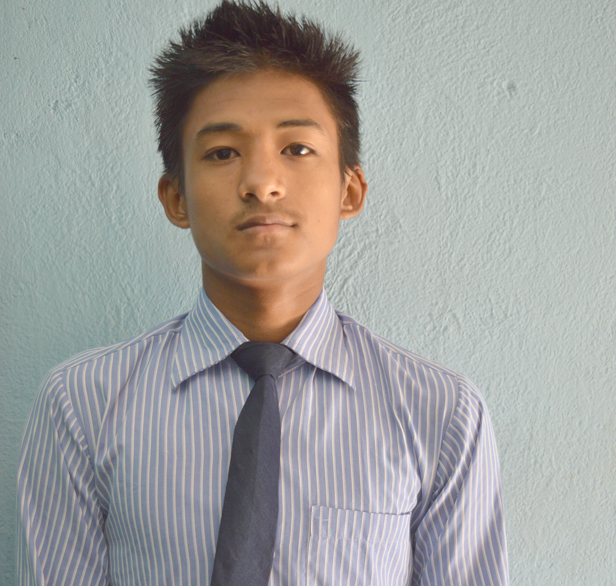On May 2 a rare 4.2 earthquake hit Western Michigan and shook Ann Arbor, devastating no one. Eight days earlier, a magnitude 7.8 earthquake hit Nepal, killing as many was 15,000 people, injuring over 12,000 more and leaving 16,000 schools shuttered. The quake left 1.3 million children in need of aid. High school freshman Krijol Shresthan talks about the massive earthquake’s impact on him, school, his family and friends.
by Zoe Ash
ON MAY 2 a rare 4.2 earthquake hit Western Michigan, devastating absolutely no one. On April 25, a magnitude 7.8 earthquake hit Nepal. According to reporting from Democracy Now, “Nepal’s army chief has warned the death toll from Saturday’s devastating 7.8-magnitude earthquake could reach 15,000. The toll now stands at over 6,000, with almost double that number injured. Hundreds of thousands have been left homeless.”
The United Nations estimates 1.3 million children in Nepal are in urgent need of humanitarian aid.
Countless villages have been destroyed, including 16,000 of the country’s schools. Even schools that haven’t been destroyed have been shut down due to fear of structural damage and safety concerns. This has left students such as 14-year-old high school freshman Krijol Shresthan to pick up the pieces.
The Nepalese educational system utilizes a standardized test which the students must pass in order to move on to the next grade. Without places to administer the tests or schools to prepare students for these exams, the country’s education system has been thrown into chaos. Krijol Shresthan is a 14-year-old 9th grader in Chitwan Valley, in southern Nepal. While his village wasn’t one of the hardest hit, he is still suffering the extreme effects of the earthquake.
The schools in Chitwan are, with the rest of Nepal, being closed for at least another month. I had the opportunity to sit down with Krijol over Skype and discuss with him the impact of this natural disaster. Showing up for our interview at 7 a.m. Nepalese time in a suit. He provides a first-hand account of living through the earthquake and how it has thrown into perspective the question of whether he will be able to return to school anytime soon.
Q. Where do you live and how hard was it hit by the earthquake?
KS: I live in Chitwan. It was not so much our town that was hit but other districts in Nepal like Kathmandu, the capital of Nepal. We were all playing, it was Saturday, we were in the field and it happened. It lasted for almost a whole minute, and afterwards we were all eating and sleeping outside for days because of the fear of aftershocks. Three nights we slept outside.
Q. How has the earthquake affected your education? Are you still able to attend school?
KS: It affects our education due to districts being closed, schools and boarding. Our school will be closed for at least one month. This will put us behind in our studies. Our school has already been closed for 5 days. Every school in Nepal is closed, they’re supposed to be closed for a month maybe longer. We have a system where we take a set of standardized tests to move up a grade, and with this long of school closings we won’t be able to take those tests on the normal schedule. So now they’re talking about moving the whole standardized testing schedule to later. But nobody knows how much later because nobody knows how long they will be closed.
Q. How has the earthquake directly affected your family?
KS: My immediate family wasn’t directly affected, but some of my relatives and friends were affected. It destroyed our relatives’ and friends’ homes, all extended family. I have a friend in Kathmandu who died, who was killed in the earthquake there.
Q: Do you have any family or friends that you haven’t been able to contact or see if they’re okay?
KS: Yeah, his name is Somnath Shrestha amd he lives in Kathmandu. From the first of the earthquake I’ve been unable to contact him.
Q. Are you or anyone you know receiving aid and if so what form is the aid coming in?
KS: Yes, they are sending different kinds of photos and saying that they are with us and praying for our country. Foreigners have money; we’re getting a lot of help from that money. It tends to live in the form of food, sleeping gear, just stuff for people without homes to live in and food to eat.
Q. How has this affected you emotionally?
KS: The earthquake affects me because it killed many people, my parents are very sad. Some people have lost their sons, some people have lost their elderly parents, some people have lost their whole families, everybody knows somebody who’s dead or has died. Aunts, uncles, everyone has a relative who’s dead.
Q. Has the earhquake brought your community together?
KS: All the neighbors know somebody who has died or have a story of some loss and now what’s happening is every family in Chitwan, even though their immediate family is fine, all their relatives are coming from the mountains and from Kathmandu down so now most of the houses have a lot of visitors in them with people who are coming to stay with them for they don’t know how long because they’ve lost their houses or their family members. It’s kind of changed the community because now there’s a bunch of new people here who weren’t here before who have all come from some horrible god awful situation. I’m not sure brought together is the right word but it’s definitely affected the community, and everybody has some story of a terrible loss.

